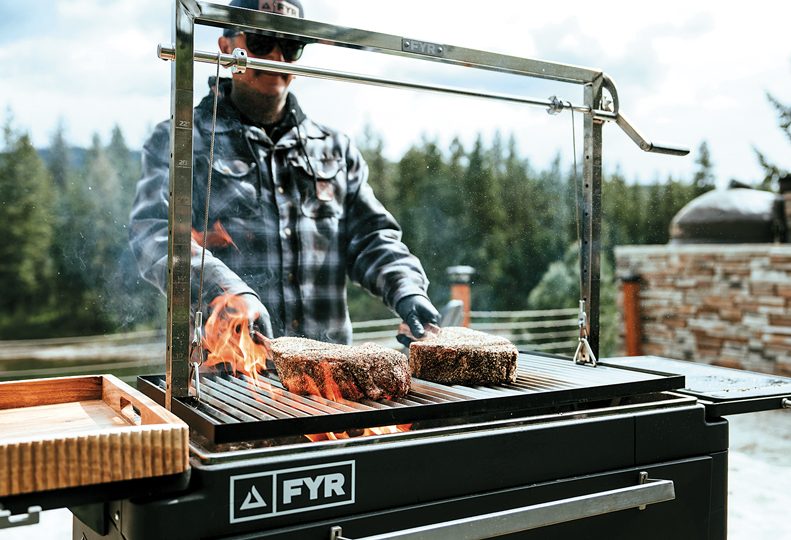Spiceology co-founder launches barbecue-grill company
Influencer-owned brand has combined 50 million followers

Fyrstarter Inc. is an influencer-owned company that sells barbecue grills, accessories, and sauces.
| FyrSpokane entrepreneur Pete Taylor, known best for co-founding Spiceology Inc., has taken many of the marketing concepts first learned at the spice company and forged a new company, Fyrstarter Inc.
Taylor, the company's chief executive officer, says the company, which does business as Fyr (pronounced like fire), is an influencer-owned company selling its own brand of barbecue grills, accessories, and sauces.
Taylor co-founded Fyr with Derek Wolf, a fire cooking expert and influencer he first met during his tenure at Spiceology. Launched in 2023, Fyr recently ran a Kickstarter campaign for its specialty-designed barbecue grills. The company sold $695,000 worth of grills during the 45-day campaign, a feat that showcases the power of the influencer, Taylor contends.
“It was primarily done from our team, the influencers, talking about it,” says Taylor of the company's 20 U.S.-based influencers, who have a combined 50 million followers. “We didn’t really put much paid marketing into it. It’s just the power of our reach with our content creators.”
The grills are now in production and expected to be delivered to customers/followers in the first quarter of 2025, according to the company’s timeline on its Kickstarter campaign page.
The Fyr Grill is the vision of pitmasters, chefs, and live-fire enthusiasts who wanted to create a grill that is durable, versatile, and portable. According to the company's Kickstarter campaign, the Fyr Grill has a collapsible design that makes it easy to use at tailgate parties and while camping, hunting, or participating in other outdoor activities.
The grill is stainless steel with a modular design that allows grillers to bolt on different accessories easily, such as the Santa Maria attachment, which allows the grillers to lower and raise the grates for temperature control. The Fyr Grill also has a battery-powered rotisserie attachment that can slow-roast whole chickens, loins, and other cuts while in transit. The company also sells three types of signature hot sauces and a honey BBQ sauce.
Taylor says the company isn't profitable yet but has reached $1 million in revenue since launching in 2023 and expects to generate $3 million in 2025.
Taylor, a 2014 Spokane Journal of Business Rising Star, founded Spiceology in 2012 with Heather Scholten and served as the company’s chief marketing officer, though he's no longer involved in the company's day-to-day operations.
During his tenure with Spiceology, he collaborated with dozens of influencers, chef celebrities, and influencer celebrities. In 2019, Spiceology participated in a product collaboration with influencer and fire grilling enthusiast Derek Wolf, whose Instagram page cites 3.4 million followers, and created a line of signature Derek Wolf and Spiceology spices and blends. The collaboration with influencers is one of the reasons the brand did so well, Taylor claims.
It's because of that success that Taylor wanted to create a company solely made up of influencers who could leverage their followers and influence to sell products, he says.
“I knew how valuable Derek was, and I knew how successful product collaborations were,” Taylor says. “I thought, well if we’re experiencing that much success with a product collaboration, imagine how well an influencer-owned brand would be.”
Influencer-owned brands aren't a new concept, he says, pointing to examples like Kylie Jenner, who started a cosmetics company, and YouTube influencer Mr. Beast, whose company, Feastables, sells chocolate bars and other candies.
Part of the reason for their success is that people tend to trust people they like over companies themselves, Taylor says.
“(Consumers) are apt to be swayed by who they look up to and who they admire, than an actual brand,” Taylor says. “It just made sense to me. Look at myself. I used to skateboard as a kid, and while there were a lot of different skateboard companies, I would always buy my skateboards from my favorite skaters.”
When he was building Spiceology, he drew inspiration from this notion, knowing that if partnering with celebrities and professionals worked for skateboard companies, it could also work for spices, he says.
According to a recent report on the State of Influencer Marketing 2024 from the Influencer Marketing Hub, the influencer marketing industry is set to grow to about $24 billion by year-end, up from $21 billion in 2023, and $1.7 billion in 2016.
Additionally, people are spending more time on social media platforms nowadays than they were in previous years. According to a study from market research company, eMarketer, daily social video consumption has risen from 33% of all social media network consumption in 2019 to 56.4% in 2023.
The grilling company doesn't have a headquarters yet, says Taylor, who splits his time between Hawaii and Spokane. The company’s 20 influencers, who Taylor prefers to call content creators and are considered co-founders in the company as well, are spread out between Spokane, and Austin, Texas, he says. While the company is comprised of content creators with large followings, Taylor also is pursuing partnerships with micro-influencers with smaller followings, he says.
As reported by the Journal of Business, influencer endorsements are governed by the rules set forth by the Federal Trade Commission, a government agency that enforces laws that prevent unfair, deceptive, and fraudulent business practices. It regulates influencers to ensure they are transparent about their brand endorsements and don’t promote false or misleading advertisements to the public.
Fyr’s influencers are veterans of the industry and knowledgeable of the FTC’s rules. However, as an influencer-owned company, they are not held to all the FTC guidelines, such as creating hashtags and proximately establishing they are doing a product endorsement for a large company.





